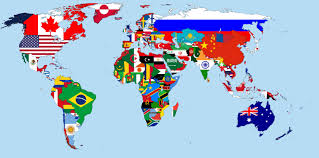In the complex landscape of global politics and international relations, certain nations stand out for their economic prowess, military might, diplomatic influence, and technological advancements. As we delve into the ranking of the top 10 most powerful countries, it's essential to explore the diverse perspectives that define power in today's world.
1. United States - Economic Hegemony and Military Superiority
The United States continues to dominate global rankings due to its massive economy, technological innovation, and unparalleled military capabilities. From Silicon Valley's tech giants to its formidable military-industrial complex, the U.S. wields influence across multiple domains, shaping global trends and policies.
2. China - Economic Ascendancy and Geopolitical Ambitions
China's meteoric rise as an economic powerhouse has propelled it to the forefront of global affairs. With the world's largest population and a rapidly growing economy, China's Belt and Road Initiative, technological advancements, and assertive foreign policy have solidified its position as a key player in shaping the 21st-century geopolitical landscape.
3. Russia - Military Strength and Strategic Maneuvering
Russia's resurgence as a major power stems from its robust military capabilities, energy resources, and strategic maneuvering in global affairs. Despite economic challenges, Russia's military interventions, diplomatic initiatives, and energy dominance in Europe contribute to its significant influence on regional and international dynamics.
4. Germany - Economic Engine of Europe
As Europe's economic powerhouse, Germany's stable economy, technological expertise, and leadership within the European Union (EU) amplify its global standing. Germany's role in shaping EU policies, trade relations, and commitment to environmental sustainability underscore its influence on continental and global affairs.
5. India - Emerging Economic Giant and Regional Power
India's rapid economic growth, demographic dividend, and strategic partnerships position it as a rising power in Asia and beyond. With a focus on technological innovation, infrastructure development, and diplomatic outreach, India's influence in South Asia and its expanding global footprint are increasingly significant.
6. Japan - Technological Innovation and Economic Resilience
Japan's technological prowess, innovation culture, and economic resilience contribute to its status as a major global player. Despite demographic challenges, Japan's strategic alliances, advanced industries, and commitment to research and development bolster its influence in trade, technology, and security cooperation.
7. United Kingdom - Historical Legacy and Global Diplomacy
The United Kingdom's historical legacy, financial hub in London, and diplomatic network underscore its continued relevance in global affairs. Despite Brexit challenges, the UK's military capabilities, intelligence cooperation, and cultural influence through soft power initiatives maintain its position as a key player on the world stage.
8. France - Military Power and Cultural Influence
France's military strength, nuclear capabilities, and cultural diplomacy project its influence beyond Europe. As a permanent member of the UN Security Council and a key player in shaping EU policies, France's strategic engagements in Africa, the Middle East, and global security issues contribute to its global clout.
9. Brazil - Regional Leader and Economic Potential
Brazil's vast resources, regional leadership in Latin America, and emerging market potential elevate its global significance. Despite economic challenges and political turbulence, Brazil's influence in environmental policies, regional integration initiatives, and BRICS cooperation enhances its role in shaping global agendas.
10. South Korea - Technological Hub and Strategic Partner
South Korea's technological innovation, economic resilience, and strategic partnerships contribute to its growing global influence. As a major player in the technology sector, a key ally of the United States, and a driver of regional stability in East Asia, South Korea's role in global trade, security, and innovation is increasingly vital.
Perspectives on Power:
Each of these top 10 powerful countries embodies different dimensions of power, ranging from economic strength and military capabilities to diplomatic prowess and cultural influence. The diversity of perspectives on power reflects the complexity of global dynamics and the evolving nature of international relations in the 21st century. Understanding these nuances is essential for navigating the geopolitical landscape and addressing global challenges collaboratively.



No comments:
Post a Comment